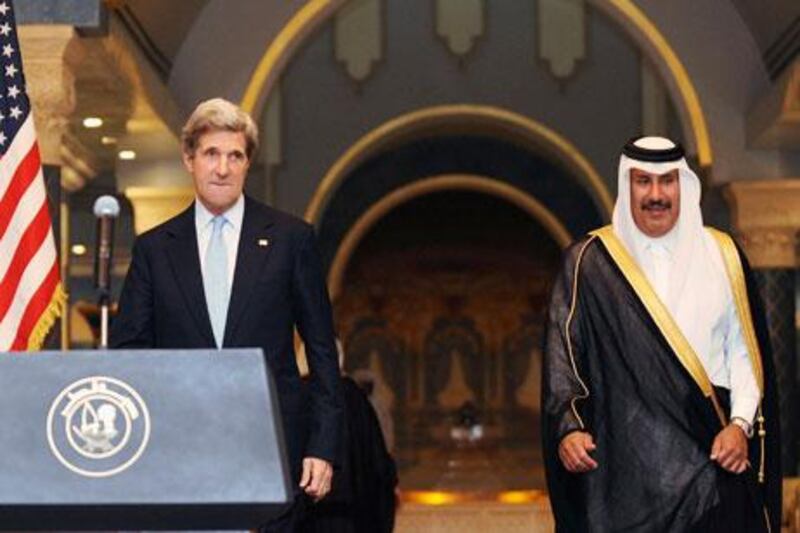Washington is confident that weapons being sent by other nations to the Syrian opposition were going to moderate forces within it, rather than to extremists, the top US diplomat said.
John Kerry, the US secretary of state, on his first overseas tour since his appointment, said at a news conference in Doha on Tuesday that he had held talks in Qatar and during an earlier stop in Saudi Arabia about which kinds of arms were being sent to which Syrian opposition forces.
"I don't think the United States is engaged in an allotment process [for weapons] but we are aware" of what other countries are doing, Mr Kerry said in a joint news conference with his Qatari counterpart, foreign minister and prime minister Hamad bin Jassim bin Jaber bin Mohammed Al Thani.
Mr Kerry said that there are now "greater guarantees" that nearly all the arms and ammunition being supplied to rebels are getting into the hands of moderates. He said there's never a full guarantee that some weaponry won't fall into the wrong hands, but not enough to change the battlefield balance of power.
Saudi Arabia and Qatar are widely believed to be providing weapons to the rebels, but the US says it does not wish to send arms for fear they may find their way to militant Islamists who might then use them against western targets.
Mr Kerry announced last week that it would for the first time provide rebel fighters in the Free Syrian Army with non-lethal assistance - rations and medical assistance.
Mr Kerry said on Tuesday that the window for a political solution to the crisis was still open, but that the US was intent on keeping the pressure on Bashar Al Assad, the Syrian president.
Mr Kerry's comments came at the end of a 10-day visit to Europe and the Middle East, where his discussions have largely focused on Syria, and Damascus's main ally, Iran.
Some 70,000 people have been killed in Syria and about 1 million people have fled the country in a two-year uprising, according to the United Nations.
During his trip, Mr Kerry has resisted calls for Washington to directly send arms to the Syrian opposition, despite growing pressure from Gulf allies who have explicitly said the rebels deserve munitions for self defence.
But the secretary of state's comments on Tuesday indicated the US does not object to the Gulf states' transfer of arms if directed towards opposition forces viewed as moderate, rather than groups such as Al Nusra Front, which Washington considers a terrorist organisation.
Sheikh Hamad bin Jassim, whose country has long urged Washington to take a more active stance on the Syrian crisis, welcomed the open discussions with the US secretary.
"As you see, there is a change in international stance" towards arming the opposition, said Sheikh Hamad bin Jassim. "They [the US] are speaking of weapons. We had hoped that this issue had taken place long ago and spared a great deal of killing."
Mr Kerry said he had discussed with his Qatari counterpart the need to "guarantee that [weapons are] going to the right people, the Syrian opposition coalition", adding that it was only in the past few months that the opposition had gained the "capacity" to ensure transfers to moderate rebels fighting on the ground.
The Qatari foreign minister said the issue of extremists that has dominated the international discussion on arming the Syrian rebels had been "falsely magnified" and denied his country had an interest in supporting militant elements.
"The longer the crisis goes on, we will find radical groups taking part. We don't wish for these radical groups to win. We are supporting the moderates, and we cannot delay," Sheikh Hamad bin Jassim said.
During the weekend, Britain also appeared to move closer towards to arming the opposition, with its top foreign policy chief saying that it could consider providing arms if the situation deteriorated.
"We'll be doing more and we have to steadily do more [to support the opposition] if there's no diplomatic or political breakthrough," the British foreign secretary, William Hague, told the BBC.
Mr Kerry arrived in Doha from Abu Dhabi, where he met Sheikh Mohammed bin Zayed, Crown Prince and Deputy Supreme Commander of the UAE Armed Forces.
Sheikh Mohammed "underlined the political and humanitarian responsibility of the international community about dire situation being experienced by the Syrian people, and its repercussions on the stability of surrounding countries and the region as well", WAM reported.
edickinson@thenational.ae
* With additional reporting from Reuters





